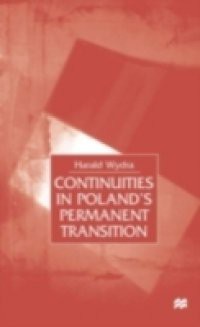This book claims that 1989 was not the rupture-point in Polish politics which studies in transitology and democratization have taken it to be. The book's primary objective is to examine the causes for Poland's lengthy transition to Western models of political and societal organization using two tracks of analysis. Part One develops a methodological framework that permits an analysis of crisis and conflict in pre- and post-1989 Polish politics as a permanent threshold situation, in which political elites have recurrently found themselves between a dissolution of order and political utopias. Part Two analyzes the socio-genesis of three images that have become central to identity politics in Poland's transition. It argues that the autonomy of Polish political elites in shaping the political order is flawed by dependencies on past images.This book studies transition in an interdisciplinary spirit. It addresses issues of identity politics by elaborating a conceptual framework which contributes to theory-building in East European transitions and also addresses students interested in theoretical questions of political and social change.

